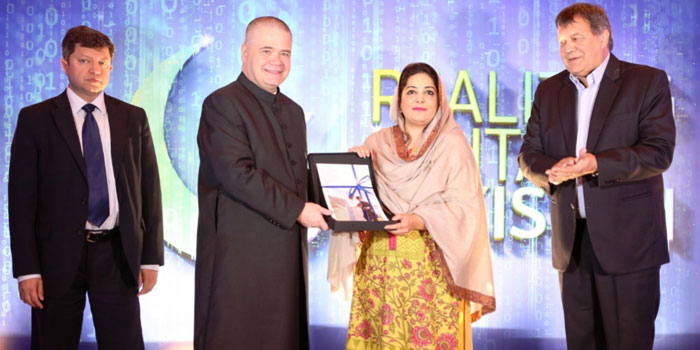Telenor has launched a report titled “Realizing Digital Pakistan” which recommends the government to:
- Reduce restrictive legislation or heavy taxation on sector
- Reduce or eliminate device and data taxes
- Develop data centers to support cloud computing
- More mentoring and funding for budding entrepreneurs and technology developers for achieving the dream of digitizing Pakistan effectively.
Pakistan can achieve digital connectivity indicators similar to Malaysia by 2020 but would have to meet prior actions including:
- Use universal services fund (USF) to strengthen fibre backbone
- Sign world Trade organization (WTO) information technologies agreement
- Reduce all activation and service taxes by 25% every year from 2016 to 2020.
The report elucidating the country’s potential of adopting digital solutions has been prepared by Telenor Group with consultative collaboration from TechPolis. It lays out a feasible roadmap which indicates how Pakistan can usher an era of digital enablement throughout the country in the next five years.
The report states that in five years or less, Pakistan can attain digital connectivity indicators similar to Malaysia. Five pillars have been identified to secure a better future for the people of Pakistan via ample utilization of digital technologies.
The report has set five targets to achieve the desired results which include;
TARGET 1: Connect all schools and hospitals to broadband Internet access, and provide all farmers with mobile access and apps
TARGET 2: Triple the 2015 total value of e-Commerce by 2020
TARGET 3: Increase transparency and access to government budgets, policies and services
TARGET 4: Pakistan to establish next-generation iHub technology incubators to resolve local challenges by leveraging technology
TARGET 5: Pakistan to achieve digital connectivity indicators similar to Malaysia by 2020
Tore Johnsen, SVP Telenor Group & Chairman Telenor said:
Pakistan has an immense potential of piloting a sustainable digital turnaround. As shown in the report, this is achieved by embracing innovative digital solutions in areas such as education, health and governance.
With the ambition of delivering Internet for All, Telenor Group strives to be a long-term partner in realizing a Digital Pakistan, together with the government, the private sector, academia and civil society.
The report also contributes to the vision laid out by the Planning Ministry in their document “Pakistan 2025 – One Nation, One Vision.”
Anusha Rahman, Minister of State for IT & Telecom said the efforts of Telenor Pakistan in realizing the digital competence of Pakistan and staying committed to developing a digital innovation ecosystem in the country are appreciated. She said:
The comprehensive report launched by Telenor Pakistan reflects how the country proceeds when it comes to utilizing digital technology in various walks of life, and the immense potential it carries for securing a better future for its people.
She also appreciated some of other Telenor Pakistan’s pioneering initiatives towards expanding the overall internet ecosystem in the country including the launch of Pakistan’s first secure online payment solution Easypay by Easypaisa among others.
Dr. Ismail Shah, Chairman PTA, said the country is now embracing digital technology as a powerful tool that is not just a means of communication, but a life-changing catalyst.
Along with other cellular operators, Telenor Pakistan has played an important role in making digital technology accessible to the people of Pakistan.
I hope, that the company continues its pursuit of a digital Pakistan where common people have access to better healthcare, education and governance at their fingertips.
Michael P. Foley, CEO, Telenor Pakistan, said Pakistan has a plethora of digital opportunities and we, at Telenor, envision a future where those opportunities can be utilized to enable widespread digitalization.
With the launch of this report, we are putting countrywide digital access at the center and attaching utmost priority to offering cutting-edge technological solutions to facilitate digital connectivity.
Going forward, Telenor Pakistan aims to play a pivotal role in government’s efforts to promote e-exclusivity for all to foster socio-economic transformation of Pakistan.
Introducing the report, Ricardo Tavares, CEO TechPolis, said Pakistan can leverage the expansion of broadband access to reform public services and the economy and unleash a new era of job creation, quality-of-life improvement and economic growth.
The country can utilize its ample repertoire of technological talent and innovative solutions to revolutionize public services in the domains of education, healthcare, and agricultural assistance.
This report presents a comprehensive view on how Pakistan can truly usher in an era of innovation and progress that can improve the lives of ordinary people. We are immensely pleased to have collaborated with Telenor Group on this report.
To realize a digital Pakistan, close coordination is required between government, the private sector, academia and civil society. Together they can expand connectivity and build innovation centers to support Pakistan’s transition to the digital economy. Aligning government policies and regulations, private investment, academic know-how and civil society activism for digitalization to benefit all, is the biggest challenge Pakistan faces in achieving its Vision 2025.
To catalyze improvements in the health sector, the best urban hospitals need to be connected to rural hospitals and health clinics via broadband Internet. Special focus will be paid to e-Health, e-Education and e-Agriculture. Mobile Health initiative will allow people in rural areas to be connected with state-of-the-art medical equipment and services in urban hospitals. E-Education will focus on providing top quality education in places where there is lack of good teachers. E-Agriculture will focus on providing farmers with real-time data that will help them in improving the quality of their work.
Aligning government policies and regulations, private investment, academic know-how and civil society activism for digitalization to benefit all, is the biggest challenge Pakistan faces in achieving its Vision 2025
USF Funds will be leveraged to assure broadband Internet connectivity between rural and urban areas. Furthermore, partnerships between the public and private sector will be urged in order to develop pilots on e-Health, e-Agriculture and e-Education.
The rapidly developing Business to Customer (B2C) e-Commerce market in Pakistan has a lot of potential. One main aim of the report is to avoid restrictive legislation and taxation, in order to let eServices thrive and to build trust in the security of online services. There is also a huge potential to boost software exports and outsourcing suggested by the success of the freelance sector, the ability of Pakistani IT workers to win international awards and a large highly-qualified, English-speaking workforce.
Mobile operators will be urged to leverage mobile identity backed by bio-metric identification to authenticate all e-Commerce transactions, an e-Procurement platform will sought after for government procurement and an enhanced trade diplomacy will take shape to promote software exports.
In order to promote accountability and transparency in the government, e-governance will be promoted even further. The aim is to bridge the gap between the public’s demand for government services and the actual availability of services. It is hoped that the government will develop a central portal giving access to all their agencies, apps and facilitate access to their data to promote app development. The web will offer civil society an effective mechanism for monitoring the government’s performance at all levels.
In the recent years, Pakistan has seen a lot of boost in the entrepreneurship sector. It is hoped to be boosted even further by the setting up technology incubators and facilitating entrepreneurs with seed money. The key to achieving this, once again, will be partnerships between the public and private sector.
The government, operators, technology vendors and academia can work together to provide facilities, greenfield funding and general mentoring for budding entrepreneurs and technology developers with government agencies and companies posing challenges.
An iHub is expected to be set up in Islamabad within the new Technology Park which will see the partnerships between operators and technology suppliers. It is also an aim to spread the “Islamabad Experience” to other cities


























good to see that
…and on her way back to office, Mrs. Rehman opened the windows and threw the copy of the report she received at the event as a first step of implementation of recommendations put up people who actually represent the term known as Information Technology.